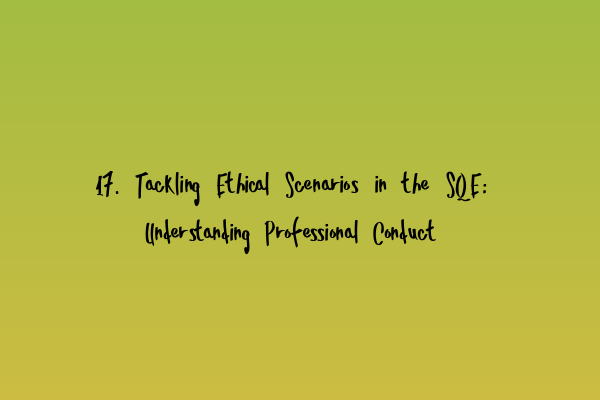Tackling Ethical Scenarios in the SQE: Understanding Professional Conduct
Welcome to SQE Exam Law, your trusted resource for all things related to the Solicitors Qualifying Exam (SQE). In this blog post, we will delve deep into the topic of professional conduct, specifically focusing on ethical scenarios that may be encountered in the SQE. By understanding the principles of professional conduct, you will be better equipped to tackle the SQE with confidence.
What is Professional Conduct?
Professional conduct refers to the ethical standards and behavior expected of legal professionals. It encompasses a wide range of principles and rules that guide lawyers in their interactions with clients, colleagues, and the legal system as a whole. Upholding high standards of professional conduct is crucial for maintaining the integrity and reputation of the legal profession.
Ethical Scenarios in the SQE
The SQE is designed to test your knowledge and understanding of professional conduct through various ethical scenarios. These scenarios will require you to analyze a situation and determine the appropriate course of action based on the principles of professional conduct.
For example, you may be presented with a scenario involving a conflict of interest between two clients. In such a situation, you would need to consider the duty of loyalty and confidentiality owed to each client, and decide how to navigate the conflict in an ethical manner. The ability to identify and address ethical issues is a crucial skill for aspiring solicitors.
Key Principles of Professional Conduct
Understanding the key principles of professional conduct is essential for tackling ethical scenarios in the SQE. Here are some of the key principles that you should familiarize yourself with:
- Integrity: Acting honestly, fairly, and with integrity is fundamental to professional conduct. Solicitors should always act in the best interests of their clients and the legal system.
- Confidentiality: Maintaining client confidentiality is of utmost importance. Solicitors must respect and protect the confidences entrusted to them by their clients, unless disclosure is required by law or permitted by the client.
- Conflict of Interest: Identifying and managing conflicts of interest is a critical aspect of professional conduct. Solicitors must avoid situations where their personal interests conflict with their duty to act in the best interests of their clients.
- Competence: Solicitors have a duty to provide competent legal services to their clients. This includes maintaining and developing their legal knowledge and skills throughout their careers.
- Independence: Solicitors should act independently and without compromising their professional judgment. They should not allow themselves to be influenced by improper factors or pressures.
Preparing for Ethical Scenarios in the SQE
As with any aspect of the SQE, preparation is key to success. Here are some tips to help you prepare for tackling ethical scenarios in the exam:
- Study the SRA Code of Conduct: Familiarize yourself with the SRA Code of Conduct, which sets out the professional standards expected of solicitors in England and Wales. Pay particular attention to the principles and rules that relate to ethical conduct.
- Review Case Studies: Go through various case studies that involve ethical dilemmas and practice analyzing the scenarios. Consider the relevant principles of professional conduct and determine the most appropriate course of action.
- Take Practice Exams: Practice is essential for improving your ability to tackle ethical scenarios. Take advantage of SQE 1 practice exam questions and SQE 1 practice mocks to test your knowledge and strengthen your skills.
- Consider Professional Courses: Consider enrolling in SQE 1 preparation courses or SQE 2 preparation courses that specifically focus on professional conduct. These courses can provide you with valuable insights and guidance.
By following these steps, you will be well-prepared to tackle ethical scenarios in the SQE with confidence and demonstrate your understanding of professional conduct.
Conclusion
Professional conduct is a fundamental aspect of the legal profession, and it plays a significant role in the SQE. By understanding the principles of professional conduct and practicing ethical decision-making, you will be well-equipped to tackle the ethical scenarios in the exam. Remember to study the SRA Code of Conduct, review case studies, and take advantage of practice exams and professional courses. Good luck on your SQE journey!
For more information and resources related to the SQE exam, check out the following articles:
